人教版(2019)必修第三册Unit 5 The Value of Money 情态动词 过去将来时课件 (31张)
文档属性
| 名称 | 人教版(2019)必修第三册Unit 5 The Value of Money 情态动词 过去将来时课件 (31张) | 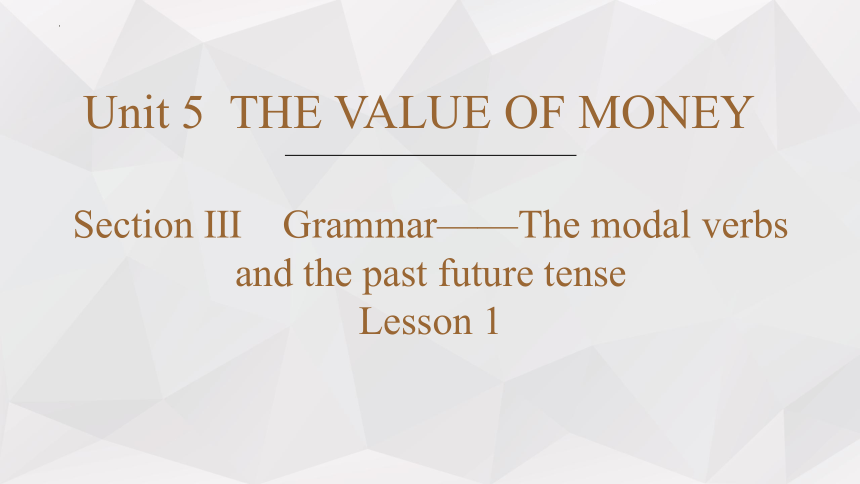 | |
| 格式 | pptx | ||
| 文件大小 | 465.1KB | ||
| 资源类型 | 教案 | ||
| 版本资源 | 人教版(2019) | ||
| 科目 | 英语 | ||
| 更新时间 | 2022-12-05 12:35:32 | ||
图片预览

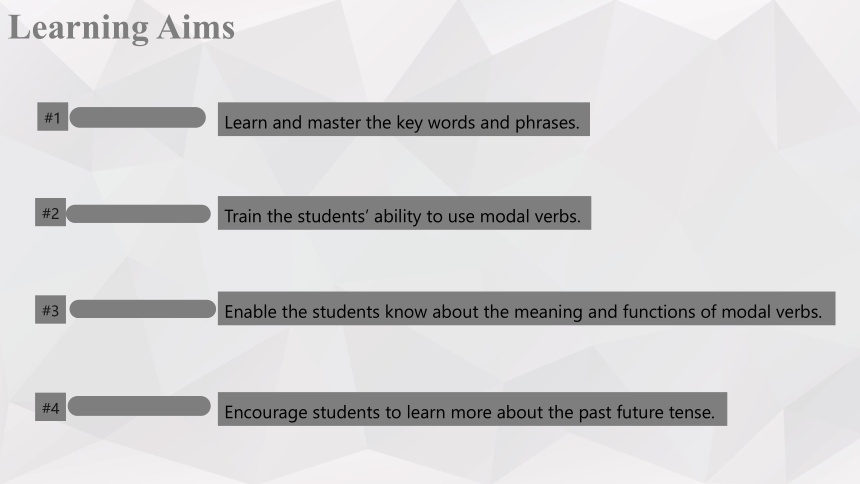
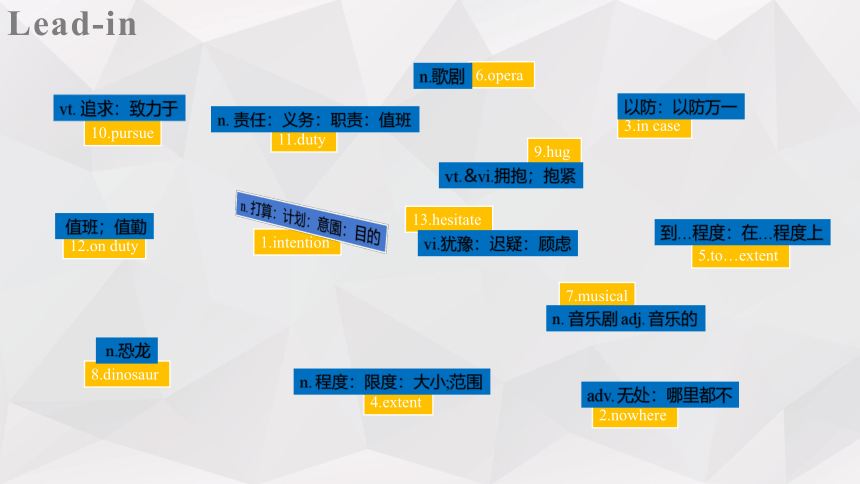

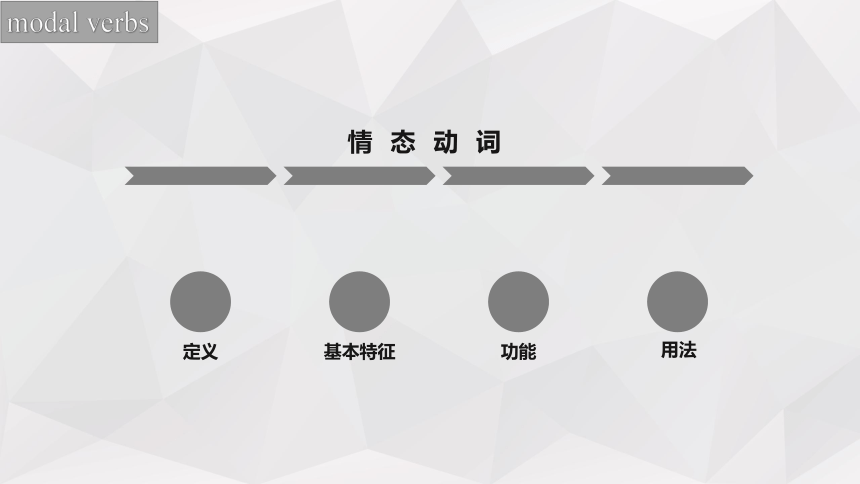
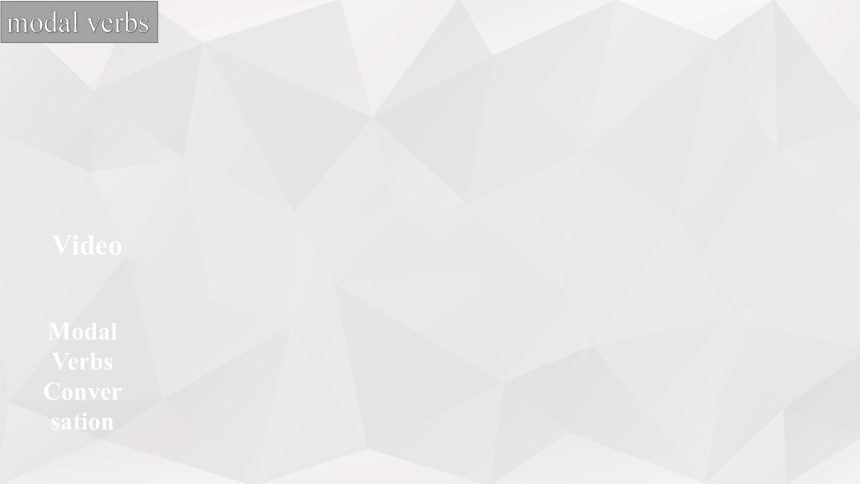
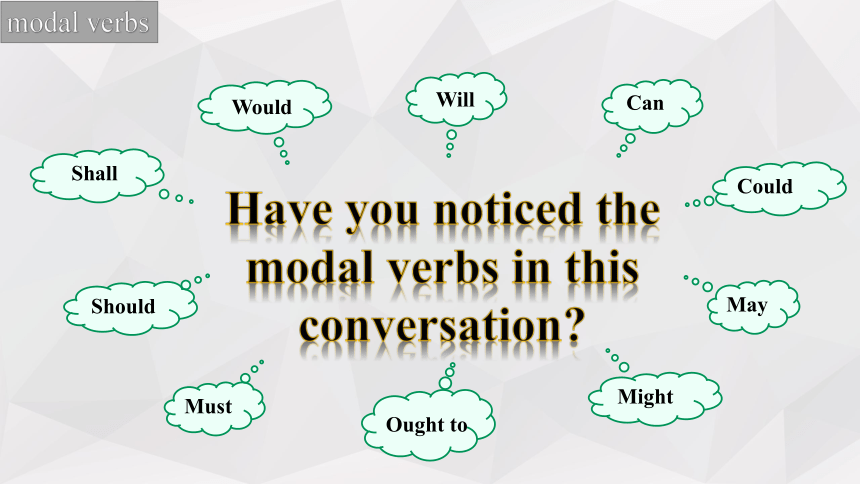
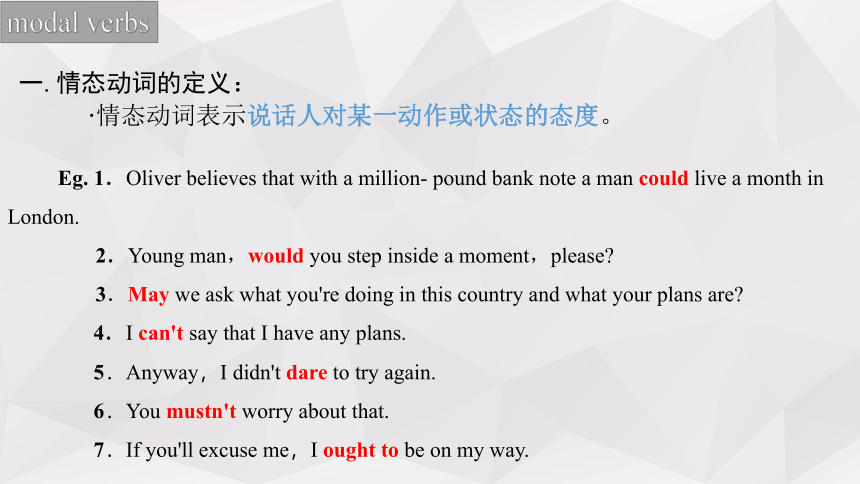
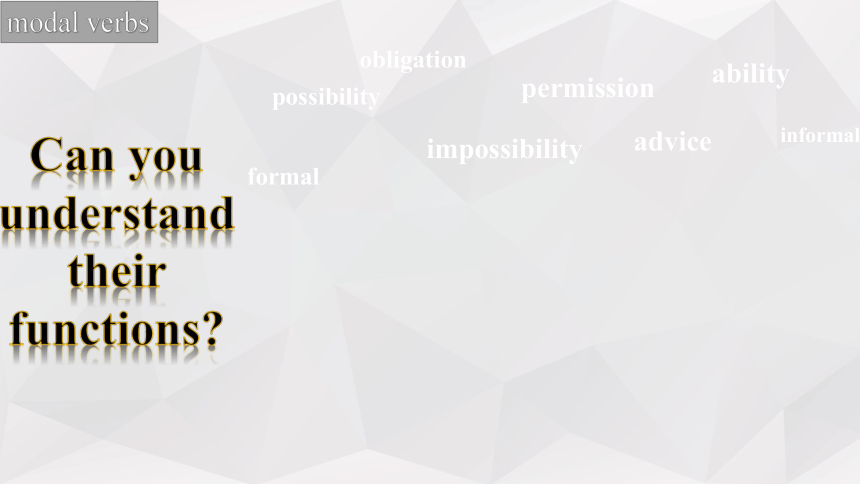

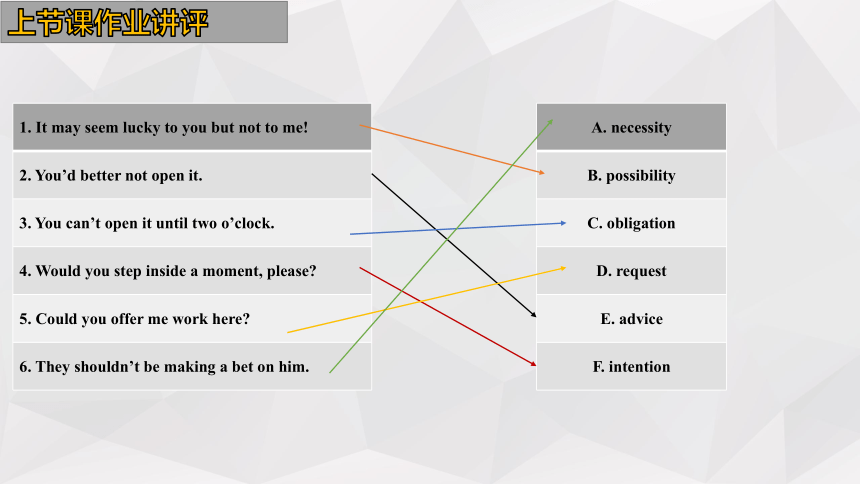
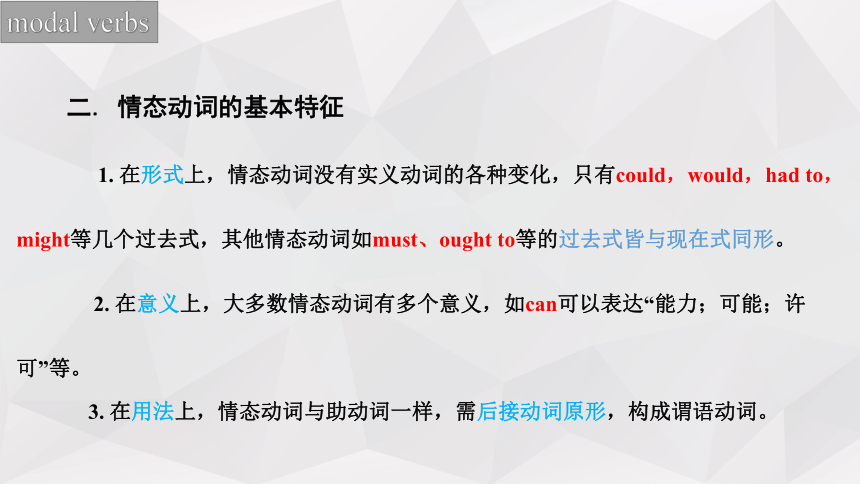
文档简介
(共31张PPT)
Unit 5 THE VALUE OF MONEY
Section Ⅲ Grammar——The modal verbs and the past future tense
Lesson 1
Learning Aims
#1
#2
#3
#4
Learn and master the key words and phrases.
Train the students’ ability to use modal verbs.
Enable the students know about the meaning and functions of modal verbs.
Encourage students to learn more about the past future tense.
1.intention
2.nowhere
3.in case
4.extent
5.to…extent
6.opera
7.musical
8.dinosaur
9.hug
10.pursue
13.hesitate
11.duty
12.on duty
n. 打算:计划:意園:目的
adv. 无处:哪里都不
以防:以防万一
n. 程度:限度:大小;范围
到…程度:在…程度上
n.歌剧
n. 音乐剧 adj. 音乐的
n.恐龙
vt.&vi.拥抱;抱紧
vt. 追求:致力于
n. 责任:义务:职责:值班
值班;值勤
vi.犹豫:迟疑:顾虑
Lead-in
01
modal verbs情态动词
情 态 动 词
定义
基本特征
功能
用法
modal verbs
Video
Modal Verbs Conversation
modal verbs
Have you noticed the modal verbs in this conversation
Can
Could
May
Might
Must
Will
Would
Shall
Should
Ought to
modal verbs
modal verbs
一. 情态动词的定义:
·情态动词表示说话人对某一动作或状态的态度。
Eg. 1.Oliver believes that with a million pound bank note a man could live a month in London.
2.Young man,would you step inside a moment,please
3.May we ask what you're doing in this country and what your plans are
4.I can't say that I have any plans.
5.Anyway,I didn't dare to try again.
6.You mustn't worry about that.
7.If you'll excuse me,I ought to be on my way.
modal verbs
possibility
Can you understand their functions
ability
advice
obligation
impossibility
permission
formal
informal
四.情态动词的主要表意功能
modal verbs
用法 例句 用法 例句
表示能力 The little boy can read and write. I could feel the ground shaking. 表示发出指示或提出请求 Will you please take her to the library
Could you offer me work here
May we ask what you're doing in this country?
表示可能和推测 Oh,you must be Sylvia's husband. That might not be true. There ought to be enough space for all of us. 表示提出帮助或发出邀请 Will you stay for lunch
May I help you
Shall I put it in a box?
表示提出建议 You could ask the teacher for help. You should write him a letter. The cookies Susan made are delicious,you ought to try some. 表示许可或禁止 You can't open it until two o'clock.
You may not smoke here.
You mustn't do that.
表示愿望 Would you recommend the play to other people I would like to know the date. I'd love to go to your birthday party. 表示义务和需要 You must come at once.
We have to wear uniforms at school.
I ought to be on my way.
上节课作业讲评
1. It may seem lucky to you but not to me!
2. You’d better not open it.
3. You can’t open it until two o’clock.
4. Would you step inside a moment, please
5. Could you offer me work here
6. They shouldn’t be making a bet on him.
A. necessity
B. possibility
C. obligation
D. request
E. advice
F. intention
二. 情态动词的基本特征
1. 在形式上,情态动词没有实义动词的各种变化,只有could,would,had to,might等几个过去式,其他情态动词如must、ought to等的过去式皆与现在式同形。
2. 在意义上,大多数情态动词有多个意义,如can可以表达“能力;可能;许可”等。
3. 在用法上,情态动词与助动词一样,需后接动词原形,构成谓语动词。
modal verbs
modal verbs
三.情态动词的否定式及缩略形式
情态动词 否定式 缩略形式 情态动词 否定式 缩略形式
can can not can't shall shall not shan't
could could not couldn't should should not shouldn't
may may not / will will not won't
might might not mightn't would would not wouldn't
must must not mustn't need need not needn't
dare dare not daren't ought to ought not to oughtn't to
modal verbs
巩固训练
一 .用适当的情态动词填空
1.—Can't you stay a little longer
—It's getting late. I really go now. My daughter is at home alone.
2.You park here!It‘s an emergency exit(紧急出口).
3.Doctors say that exercise is important for health,but it be regular exercise.
4.—Why are your eyes so red?You have slept well last night.
—Yeah,I stayed up late writing a report.
5.George have gone too far. His coffee is still warm.
6.You be Carol. You haven't changed a bit after all these years.
must
mustn't
must
can't
can't
must
4.情态动词难点透视
(1) ①can表示可能性时,指的是理论上的可能,它通常不用来表示某事实际发生的可能性或真实性。
Eg. Accidents can happen. Anybody can make mistakes.
如果我们要表达某事发生的实际可能性,要用may,could或might等。
Eg. We may spend our summer holidays in Hangzhou this year.
②could用来征求意见时,语气要比can委婉,但在回答问题时我们不能用could,因为语气委婉,可能性就变小了。
Eg.—Could I use your telephone
—Yes,please go ahead.
③在过去时态的肯定句中需要某种条件或努力做成某事,我们要用was/were able to而不能用could。
Eg. It was a holiday and the children were able to go to the seaside.
The girl worked hard so she was able to pass the final test.
modal verbs
4.情态动词难点透视
(2) must与have to都可以表示“必须”的意思,但要注意以下两点区别。
①must只有现在时,而have to有现在时、过去时和将来时。
Eg. We must work hard,or we'll fail in the examination.
Years ago,the poor girl had to leave school for lack of money.
②must表示主观看法,have to则侧重于客观需要。
Eg. We must be strict with ourselves in everything. In cities with many cars,some people have to wear masks.
(3)must表示推测时,其反意疑问句有好几种形式。
①“must+动词原形”对目前的情况进行推测时以及用must+be+v- ing形式对目前正在发生的情况进行推测时,疑问短语部分要与must之后的动词相一致。
Eg. The mathematics teacher must be in the office now,isn't he
②“must+have+过去分词”用来表示对已经发生的事情进行推论。如果句子中有过去的时间状语,疑问部分用助动词didn't;否则,疑问部分用haven't或hasn't。
Eg. The children must have watered the tomatoes yesterday,didn't they
The minister must have arrived in Shanghai,hasn't he
modal verbs
4.情态动词难点透视
(4) 当情态动词will表示意愿或决心时,是可以用于条件状语从句。
Eg. If you will listen to me,I'll give you some advice on how to learn English.
(5)should除表示必要或义务外,还可表示推测或可能。如:
Eg. The American friends should be here now.
“should/ought to+have+过去分词”既可表示本该做而事实上没有做的事,也可以表示惊讶、责备、赞叹等情绪。
Eg. You should have told her about it the day before yesterday(前天).
It's wonderful that you should have achieved so much in these years.
“情态动词+have+过去分词”是很重要的一种句型,除should外,may,might,must,couldn't,needn't,ought to等都可以用于这一句型,但要注意使用不同的情态动词句子的意思就有所不同。
(6) ought to与should意思接近,大多数情况下二者可以互换,但是should谈的是自己的主观看法,ought to则更多反映客观情况,在谈到法律、义务和规定时使用。如:
Eg. We should/ought to help each other and learn from each other in our work.
She is your mother,so you ought to support her.
modal verbs
4.情态动词难点透视
(7)dare与need的用法
①dare作为情态动词,主要用于疑问句、否定句和条件从句中,一般不用于肯定句。
Eg. a.How dare you say I'm unfair
b.If he dare break the rule,he will be punished.
②need表示“需要”或“必须”,作情态动词用时,仅用于否定句或疑问句、条件从句中。意为“有……必要”。在肯定句中一般用must,have to,ought to或should代替。
Eg. a.You needn't come so early.
b.—Need I finish the work today —Yes,you must./No,you needn't.
c.If you need go there,please let me know.
③dare和need常用作实义动词,有时态、人称和数的变化。所不同的是,在肯定句中,dare后面通常接带to的不定式;在否定和疑问句中,dare后可接带to或不带to的不定式。
Eg. a.I dare to swim across the river.
b.He doesn't dare(to)answer.
modal verbs
modal verbs
巩固训练
二 . 短文填空
In the film The Million Pound Bank Note, Henry Adams is stuck in a foreign country without money and friends, and with nowhere to stay. While this situation _________ seem unusual, it can sometimes happen to travelers. In case it happens to you on a trip abroad, what __________ you do First, and most importantly, you __________ stay calm. Fear _________ cause you to become confused. You need to think clearly.
Second, you should go to your nearest consulate. They ________ _ be able to help to some extent. Third, you _________ do well to check with some local charities. They _________ offer help to travelers in need. Fourth, you avoid getting into trouble. You _________ think that stealing some money or food would help you, but you should not do so. Getting caught _________ ruin your life.
may must can ought to
might had better would should
might
should
must
would
ought to
would
can
had better
might
may
01
modal verbs情态动词
Unit 5 THE VALUE OF MONEY
Section Ⅲ Grammar——The modal verbs and the past future tense
Lesson 3
Learning Aims
#1
#2
Enable the students know about the past future tense.
Encourage students to learn more about the past future tense.
02
The past future tense
过去将来时
The past future tense
一. 过去将来时的定义:
·过去将来时表示在过去某一时间将要发生的动作或存在的状态。过去将来时常用在主句谓语动词为过去时态的宾语从句中。过去将来时句子中有时包含时间状语the next day,soon等。
Eg. 1.I was about to get the letter.
2.They said the letter inside would explain what it was all about.
3.The director said he would meet the famous actor the next day.
4.They were going to find someone to take part in their bet when they saw Henry walking on the street outside.
The past future tense
二.过去将来时的基本构成和用法
·过去将来时由“would+动词原形”构成,主要表示从过去某一时间来看将要发生的动作(尤其用于宾语从句中),还可以表示过去的动作习惯或倾向。
Eg. 1. Jeff knew he would be tired the next day.
2. He promised that he would not open the letter until 2 o'clock.
3. She said that she wouldn't do that again.
The past future tense
三.表示过去将来时的其他表达法
(1)was/were going to+动词原形:该结构有两个主要用法,一是表示过去的打算,二是表示在过去看来有迹象表明将要发生某事。
Eg. I thought it was going to rain.
(2)was/were to+动词原形:主要表示过去按计划或安排要做的事情。
Eg. She said she was to get married next month.
(3)was/were about to+动词原形:表示在过去看来即将要发生的动作,由于本身已含有“即将”的意味,所以不再与表示具体的将来时间状语连用。
Eg. I was about to go to bed when the phone rang(铃).
(4)was/were+现在分词:表示在过去看来即将发生的动作,通常可用于该结构中的动词是come,go,leave,arrive,begin,start,stop,close,open,die,join,borrow,buy等瞬间动词。
Eg. Jack said he was leaving tomorrow.
The past future tense
四. Exercises
1.莉莉说晚上将有一场音乐会。
Lily said there that evening.
2.她确信她会成功。
She was sure she .
3.我想知道我们什么时候出发。
I wanted to know when we .
4.他说运动会就要开始了。
He said the sport meet .
5.他说他今晚要走。
He said he tonight.
would be a concert
would succeed
were going to set off
was about to begin
was leaving
四. Exercises
Ⅰ.单句语法填空
1.When he was young,he sit in front of the TV set for hours every day.
2.I was sure that they not do that again.
3.Whenever she had time,she come to see us.
4.He said that he (leave) at six the next day.
5.No body knew why he (go) to the big city.
6.He hoped his wife (come) soon.
7.He was about (leave) when someone knocked at the door of his office.
8.He said he (learn) French next week.
9.I noticed that it (rain) when I looked at the sky.
10.He said he be ninety years old in two years.
would
would
would
was leaving
was going
was coming
to leave
was going to learn
was going to rain
would
The past future tense
Homework
1.课本87页第四题 2.课文语法填空
The two gentlemen had been having a heated argument for a couple of days,and had decided to make a bet which 1. settle their argument. They (find) someone to take part in their bet when they saw Henry walking on the street outside. They invited him into their house, 3. Henry told them he had landed in Britain 4. accident. Although he had gone to the American consulate 5. seek help,he had not received any. Henry hoped that the brothers 6. offer him some jobs because he had no money. Henry got upset with the brothers 7. they seemed too happy about his bad luck. They quickly told him not to feel that way and they gave him an envelope with money in it. They said the letter inside 8. explain what it was all about,but he had to postpone 9. (open) it until 2 o'clock. Henry felt that was odd. The story ended with Henry leaving their house and promising that he 10. (not) open the letter until 2 o'clock.
四. Exercises
Ⅱ.短文语法填空
The two gentlemen had been having a heated argument for a couple of days,and had decided to make a bet which 1. settle their argument. They (find) someone to take part in their bet when they saw Henry walking on the street outside. They invited him into their house, 3. Henry told them he had landed in Britain 4. accident. Although he had gone to the American consulate 5. seek help,he had not received any. Henry hoped that the brothers 6. offer him some jobs because he had no money. Henry got upset with the brothers 7. they seemed too happy about his bad luck. They quickly told him not to feel that way and they gave him an envelope with money in it. They said the letter inside 8. explain what it was all about,but he had to postpone 9. (open) it until 2 o'clock. Henry felt that was odd. The story ended with Henry leaving their house and promising that he 10. (not) open the letter until 2 o'clock.
would
2.were going to find
where
by
to
would
when
would
opening
would not
The past future tense
Unit 5 THE VALUE OF MONEY
Section Ⅲ Grammar——The modal verbs and the past future tense
Lesson 1
Learning Aims
#1
#2
#3
#4
Learn and master the key words and phrases.
Train the students’ ability to use modal verbs.
Enable the students know about the meaning and functions of modal verbs.
Encourage students to learn more about the past future tense.
1.intention
2.nowhere
3.in case
4.extent
5.to…extent
6.opera
7.musical
8.dinosaur
9.hug
10.pursue
13.hesitate
11.duty
12.on duty
n. 打算:计划:意園:目的
adv. 无处:哪里都不
以防:以防万一
n. 程度:限度:大小;范围
到…程度:在…程度上
n.歌剧
n. 音乐剧 adj. 音乐的
n.恐龙
vt.&vi.拥抱;抱紧
vt. 追求:致力于
n. 责任:义务:职责:值班
值班;值勤
vi.犹豫:迟疑:顾虑
Lead-in
01
modal verbs情态动词
情 态 动 词
定义
基本特征
功能
用法
modal verbs
Video
Modal Verbs Conversation
modal verbs
Have you noticed the modal verbs in this conversation
Can
Could
May
Might
Must
Will
Would
Shall
Should
Ought to
modal verbs
modal verbs
一. 情态动词的定义:
·情态动词表示说话人对某一动作或状态的态度。
Eg. 1.Oliver believes that with a million pound bank note a man could live a month in London.
2.Young man,would you step inside a moment,please
3.May we ask what you're doing in this country and what your plans are
4.I can't say that I have any plans.
5.Anyway,I didn't dare to try again.
6.You mustn't worry about that.
7.If you'll excuse me,I ought to be on my way.
modal verbs
possibility
Can you understand their functions
ability
advice
obligation
impossibility
permission
formal
informal
四.情态动词的主要表意功能
modal verbs
用法 例句 用法 例句
表示能力 The little boy can read and write. I could feel the ground shaking. 表示发出指示或提出请求 Will you please take her to the library
Could you offer me work here
May we ask what you're doing in this country?
表示可能和推测 Oh,you must be Sylvia's husband. That might not be true. There ought to be enough space for all of us. 表示提出帮助或发出邀请 Will you stay for lunch
May I help you
Shall I put it in a box?
表示提出建议 You could ask the teacher for help. You should write him a letter. The cookies Susan made are delicious,you ought to try some. 表示许可或禁止 You can't open it until two o'clock.
You may not smoke here.
You mustn't do that.
表示愿望 Would you recommend the play to other people I would like to know the date. I'd love to go to your birthday party. 表示义务和需要 You must come at once.
We have to wear uniforms at school.
I ought to be on my way.
上节课作业讲评
1. It may seem lucky to you but not to me!
2. You’d better not open it.
3. You can’t open it until two o’clock.
4. Would you step inside a moment, please
5. Could you offer me work here
6. They shouldn’t be making a bet on him.
A. necessity
B. possibility
C. obligation
D. request
E. advice
F. intention
二. 情态动词的基本特征
1. 在形式上,情态动词没有实义动词的各种变化,只有could,would,had to,might等几个过去式,其他情态动词如must、ought to等的过去式皆与现在式同形。
2. 在意义上,大多数情态动词有多个意义,如can可以表达“能力;可能;许可”等。
3. 在用法上,情态动词与助动词一样,需后接动词原形,构成谓语动词。
modal verbs
modal verbs
三.情态动词的否定式及缩略形式
情态动词 否定式 缩略形式 情态动词 否定式 缩略形式
can can not can't shall shall not shan't
could could not couldn't should should not shouldn't
may may not / will will not won't
might might not mightn't would would not wouldn't
must must not mustn't need need not needn't
dare dare not daren't ought to ought not to oughtn't to
modal verbs
巩固训练
一 .用适当的情态动词填空
1.—Can't you stay a little longer
—It's getting late. I really go now. My daughter is at home alone.
2.You park here!It‘s an emergency exit(紧急出口).
3.Doctors say that exercise is important for health,but it be regular exercise.
4.—Why are your eyes so red?You have slept well last night.
—Yeah,I stayed up late writing a report.
5.George have gone too far. His coffee is still warm.
6.You be Carol. You haven't changed a bit after all these years.
must
mustn't
must
can't
can't
must
4.情态动词难点透视
(1) ①can表示可能性时,指的是理论上的可能,它通常不用来表示某事实际发生的可能性或真实性。
Eg. Accidents can happen. Anybody can make mistakes.
如果我们要表达某事发生的实际可能性,要用may,could或might等。
Eg. We may spend our summer holidays in Hangzhou this year.
②could用来征求意见时,语气要比can委婉,但在回答问题时我们不能用could,因为语气委婉,可能性就变小了。
Eg.—Could I use your telephone
—Yes,please go ahead.
③在过去时态的肯定句中需要某种条件或努力做成某事,我们要用was/were able to而不能用could。
Eg. It was a holiday and the children were able to go to the seaside.
The girl worked hard so she was able to pass the final test.
modal verbs
4.情态动词难点透视
(2) must与have to都可以表示“必须”的意思,但要注意以下两点区别。
①must只有现在时,而have to有现在时、过去时和将来时。
Eg. We must work hard,or we'll fail in the examination.
Years ago,the poor girl had to leave school for lack of money.
②must表示主观看法,have to则侧重于客观需要。
Eg. We must be strict with ourselves in everything. In cities with many cars,some people have to wear masks.
(3)must表示推测时,其反意疑问句有好几种形式。
①“must+动词原形”对目前的情况进行推测时以及用must+be+v- ing形式对目前正在发生的情况进行推测时,疑问短语部分要与must之后的动词相一致。
Eg. The mathematics teacher must be in the office now,isn't he
②“must+have+过去分词”用来表示对已经发生的事情进行推论。如果句子中有过去的时间状语,疑问部分用助动词didn't;否则,疑问部分用haven't或hasn't。
Eg. The children must have watered the tomatoes yesterday,didn't they
The minister must have arrived in Shanghai,hasn't he
modal verbs
4.情态动词难点透视
(4) 当情态动词will表示意愿或决心时,是可以用于条件状语从句。
Eg. If you will listen to me,I'll give you some advice on how to learn English.
(5)should除表示必要或义务外,还可表示推测或可能。如:
Eg. The American friends should be here now.
“should/ought to+have+过去分词”既可表示本该做而事实上没有做的事,也可以表示惊讶、责备、赞叹等情绪。
Eg. You should have told her about it the day before yesterday(前天).
It's wonderful that you should have achieved so much in these years.
“情态动词+have+过去分词”是很重要的一种句型,除should外,may,might,must,couldn't,needn't,ought to等都可以用于这一句型,但要注意使用不同的情态动词句子的意思就有所不同。
(6) ought to与should意思接近,大多数情况下二者可以互换,但是should谈的是自己的主观看法,ought to则更多反映客观情况,在谈到法律、义务和规定时使用。如:
Eg. We should/ought to help each other and learn from each other in our work.
She is your mother,so you ought to support her.
modal verbs
4.情态动词难点透视
(7)dare与need的用法
①dare作为情态动词,主要用于疑问句、否定句和条件从句中,一般不用于肯定句。
Eg. a.How dare you say I'm unfair
b.If he dare break the rule,he will be punished.
②need表示“需要”或“必须”,作情态动词用时,仅用于否定句或疑问句、条件从句中。意为“有……必要”。在肯定句中一般用must,have to,ought to或should代替。
Eg. a.You needn't come so early.
b.—Need I finish the work today —Yes,you must./No,you needn't.
c.If you need go there,please let me know.
③dare和need常用作实义动词,有时态、人称和数的变化。所不同的是,在肯定句中,dare后面通常接带to的不定式;在否定和疑问句中,dare后可接带to或不带to的不定式。
Eg. a.I dare to swim across the river.
b.He doesn't dare(to)answer.
modal verbs
modal verbs
巩固训练
二 . 短文填空
In the film The Million Pound Bank Note, Henry Adams is stuck in a foreign country without money and friends, and with nowhere to stay. While this situation _________ seem unusual, it can sometimes happen to travelers. In case it happens to you on a trip abroad, what __________ you do First, and most importantly, you __________ stay calm. Fear _________ cause you to become confused. You need to think clearly.
Second, you should go to your nearest consulate. They ________ _ be able to help to some extent. Third, you _________ do well to check with some local charities. They _________ offer help to travelers in need. Fourth, you avoid getting into trouble. You _________ think that stealing some money or food would help you, but you should not do so. Getting caught _________ ruin your life.
may must can ought to
might had better would should
might
should
must
would
ought to
would
can
had better
might
may
01
modal verbs情态动词
Unit 5 THE VALUE OF MONEY
Section Ⅲ Grammar——The modal verbs and the past future tense
Lesson 3
Learning Aims
#1
#2
Enable the students know about the past future tense.
Encourage students to learn more about the past future tense.
02
The past future tense
过去将来时
The past future tense
一. 过去将来时的定义:
·过去将来时表示在过去某一时间将要发生的动作或存在的状态。过去将来时常用在主句谓语动词为过去时态的宾语从句中。过去将来时句子中有时包含时间状语the next day,soon等。
Eg. 1.I was about to get the letter.
2.They said the letter inside would explain what it was all about.
3.The director said he would meet the famous actor the next day.
4.They were going to find someone to take part in their bet when they saw Henry walking on the street outside.
The past future tense
二.过去将来时的基本构成和用法
·过去将来时由“would+动词原形”构成,主要表示从过去某一时间来看将要发生的动作(尤其用于宾语从句中),还可以表示过去的动作习惯或倾向。
Eg. 1. Jeff knew he would be tired the next day.
2. He promised that he would not open the letter until 2 o'clock.
3. She said that she wouldn't do that again.
The past future tense
三.表示过去将来时的其他表达法
(1)was/were going to+动词原形:该结构有两个主要用法,一是表示过去的打算,二是表示在过去看来有迹象表明将要发生某事。
Eg. I thought it was going to rain.
(2)was/were to+动词原形:主要表示过去按计划或安排要做的事情。
Eg. She said she was to get married next month.
(3)was/were about to+动词原形:表示在过去看来即将要发生的动作,由于本身已含有“即将”的意味,所以不再与表示具体的将来时间状语连用。
Eg. I was about to go to bed when the phone rang(铃).
(4)was/were+现在分词:表示在过去看来即将发生的动作,通常可用于该结构中的动词是come,go,leave,arrive,begin,start,stop,close,open,die,join,borrow,buy等瞬间动词。
Eg. Jack said he was leaving tomorrow.
The past future tense
四. Exercises
1.莉莉说晚上将有一场音乐会。
Lily said there that evening.
2.她确信她会成功。
She was sure she .
3.我想知道我们什么时候出发。
I wanted to know when we .
4.他说运动会就要开始了。
He said the sport meet .
5.他说他今晚要走。
He said he tonight.
would be a concert
would succeed
were going to set off
was about to begin
was leaving
四. Exercises
Ⅰ.单句语法填空
1.When he was young,he sit in front of the TV set for hours every day.
2.I was sure that they not do that again.
3.Whenever she had time,she come to see us.
4.He said that he (leave) at six the next day.
5.No body knew why he (go) to the big city.
6.He hoped his wife (come) soon.
7.He was about (leave) when someone knocked at the door of his office.
8.He said he (learn) French next week.
9.I noticed that it (rain) when I looked at the sky.
10.He said he be ninety years old in two years.
would
would
would
was leaving
was going
was coming
to leave
was going to learn
was going to rain
would
The past future tense
Homework
1.课本87页第四题 2.课文语法填空
The two gentlemen had been having a heated argument for a couple of days,and had decided to make a bet which 1. settle their argument. They (find) someone to take part in their bet when they saw Henry walking on the street outside. They invited him into their house, 3. Henry told them he had landed in Britain 4. accident. Although he had gone to the American consulate 5. seek help,he had not received any. Henry hoped that the brothers 6. offer him some jobs because he had no money. Henry got upset with the brothers 7. they seemed too happy about his bad luck. They quickly told him not to feel that way and they gave him an envelope with money in it. They said the letter inside 8. explain what it was all about,but he had to postpone 9. (open) it until 2 o'clock. Henry felt that was odd. The story ended with Henry leaving their house and promising that he 10. (not) open the letter until 2 o'clock.
四. Exercises
Ⅱ.短文语法填空
The two gentlemen had been having a heated argument for a couple of days,and had decided to make a bet which 1. settle their argument. They (find) someone to take part in their bet when they saw Henry walking on the street outside. They invited him into their house, 3. Henry told them he had landed in Britain 4. accident. Although he had gone to the American consulate 5. seek help,he had not received any. Henry hoped that the brothers 6. offer him some jobs because he had no money. Henry got upset with the brothers 7. they seemed too happy about his bad luck. They quickly told him not to feel that way and they gave him an envelope with money in it. They said the letter inside 8. explain what it was all about,but he had to postpone 9. (open) it until 2 o'clock. Henry felt that was odd. The story ended with Henry leaving their house and promising that he 10. (not) open the letter until 2 o'clock.
would
2.were going to find
where
by
to
would
when
would
opening
would not
The past future tense
